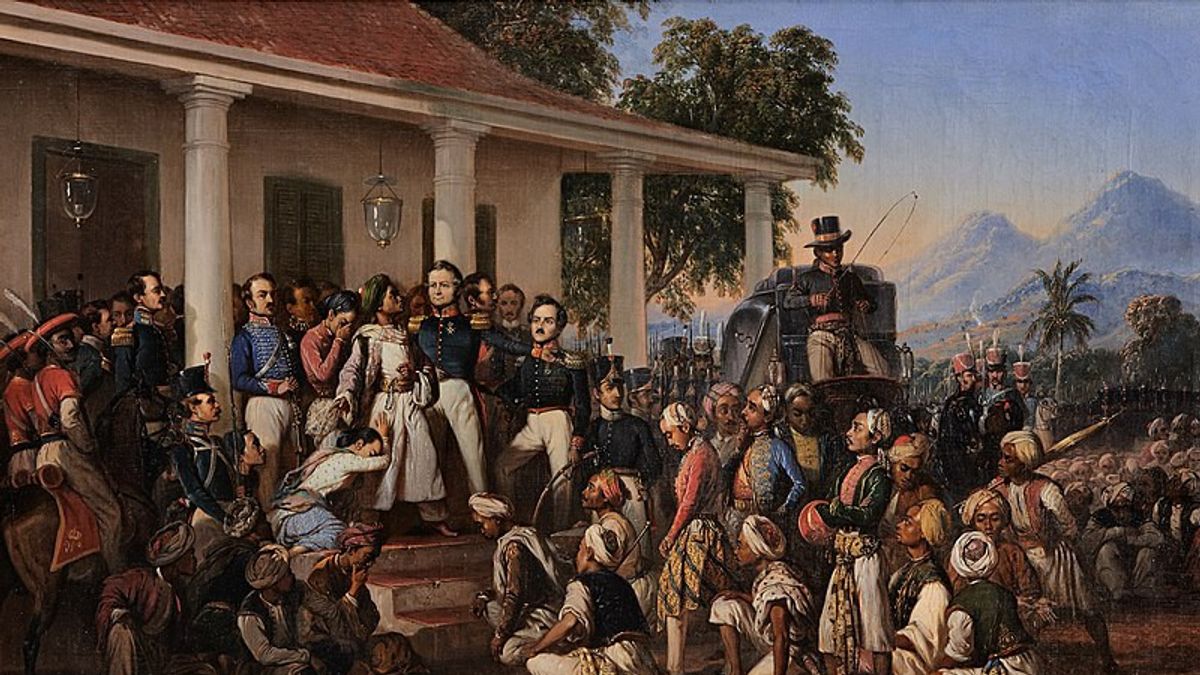JAKARTA - The total lunar eclipse is a common natural phenomenon. Nothing special for its appearance. However, not for most Javanese during the Dutch colonial period. The lunar eclipse is more than just a natural phenomenon.
The lunar eclipse is hailed like a marker of bad luck that will hit the whole of Java. Terror fears spread. That trust thrived as the truth gave an answer. Moreover, the end of Prince Diponegoro's power in Java was marked by the appearance of a lunar eclipse.
Javanese trust in natural signs is second to none. In fact, since time immemorial. Certain natural phenomena are considered a sign of the presence of a depressive era. From the presence of the mountain erupted, a long dry, to an eclipse.
This assumption is corroborated by the presence of hereditary stories related to the occurrence of natural phenomena. The lunar eclipse, for example. This phenomenon is believed to be strong because of Batara Kala's actions, a giant that often appears in Javanese puppets.
The presence of the eclipse is believed to be closely related to the frightening giant's actions by swallowing the sun (solar eclipse) or the moon (month eclipse). The whole earth darkens because of it. One by one disaster then fell to earth.
Take for example when the first is still the number one person in the Kingdom of Mataram Islam. Natural phenomena, including eclipses, often appear in the government. The incident indicated that something was wrong with the power of Mangkurat in Java.
He often perpetuates violence and acts unfairly. Likewise with his followers. From ministers to regents. They don't care about the fate of the people, as long as their position is safe. Therefore, the whole island of Java was given a sign through eclipses and earthquakes. A sign or indication that the state (Mataram) will be damaged.
Mataram during the first administration was eventually damaged, and the people suffered. Not only did many die when Mount Merapi erupted, but they were also hit by starvation during 1674-1676, due to drought or flooding so that the rice fields were abandoned.
"To get 10 liters of rice in one place is very difficult," said Residen Jepara. The raid was also continuous due to the invasion of Trunojoyo's troops, attacks by Makassar, interventions by compensing soldiers, and the breaking of the palace's kinship. The crown prince also rebelled, "said P. Swantoro in the book From Book to Book: Connecting To One (2016).
Prince Diponegoro's hatred of the Dutch is no longer restrained. He was furious to see the injustice he and the natives experienced. The Dutch only knew about the benefits of being hoarded. Meanwhile, the fate of the bumiputras was squeezed like dairy cows.
Prince Diponegoro fought back. All the bumiputras in Java stand with him. He is considered a just queen who will expel Dutch colonialism. The scholars were also involved in it.
Since then, Diponegoro's resistance has been widely known as the Java War (1825-1830). Diponegoro's ability to organize tactics is behind it. Prince Diponegoro was able to select officials, commanders, and religious advisors who fought with him. The guerrilla strategy killed many steps by Dutch troops.
The Javanese war also made the Dutch a big loss. Funds were drained to fight Diponegoro. Instead of profit, the colonial government of the Dutch East Indies was forced to owe. However, the Dutch did not want to lose. Rice has become porridge," he thought.
The resistance continues to be echoed. Prince Diponegoro could not help but be pressed. Moreover, recently the divisions that were present from his side. News of the split was smelled into the people of Java, but they were reluctant to speculate.
However, the presence of a full lunar eclipse destroyed everything on March 10, 1830. This natural phenomenon made the entire Javanese people afraid in their absorption. They considered the lunar eclipse as a sign that the Javanese Prince who wanted to free Java from colonialism would end. Sure enough, 18 days later the Javanese Prince was arrested and exiled.
The full moon eclipse on the night of March 10 may also have made some people feel afraid and imagine unfortunate events. De Kock's detailed report on events involving Diponegoro while he was in Magelang, to what the general wisely called the overcomst' --namely his arrest on March 28 -- is the main source for this three-week period.
This source can be useful in addition to Diponegoro's own century ceretera, which of course gives a very different view of this same series of events. What is extraordinary is that De Kock's story is an element of his reflection. Although written from the point of view of a senior Dutch military officer and former Lieutenant Governor General of the Dutch East Indies, De Kock clearly feels burdened by the arrest of the Javanese War leader," said Peter Carey in the book Kuasa Kudayan (2000).
The English, Chinese, Japanese, Arabic, and French versions are automatically generated by the AI. So there may still be inaccuracies in translating, please always see Indonesian as our main language. (system supported by DigitalSiber.id)













